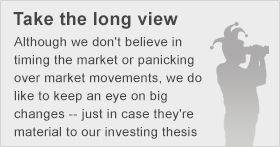
Following two days of declines, U.S stocks are marginally higher on Wednesday morning, with the benchmark S&P 500 and the narrower Dow Jones Industrial Average (^DJI 0.51%) up 0.09% and 0.1%, respectively, at 10:15 a.m. EDT. This one-way market has forced most bears to throw in the towel, according to the following statistic, courtesy of the Financial Times and Markit: At 2% of total shares of all companies in the S&P 500, the short interest (the number of shares that have been sold short) is close to the lowest level since Markit began tracking the data in 2006. Perhaps that number will fall further today, as Citigroup (C +0.05%) is said to be close to a $7 billion-plus settlement with the Department of Justice regarding the selling of shoddy mortgages during the housing boom. Bank of America (BAC +1.06%), one of the last holdouts, will be closely following these developments, as well as the market's reaction.

There is nothing like the threat of a lawsuit from the federal government to motivate a bank to settle claims that it has misbehaved. Last month, Citigroup was hoping $4 billion would allow it to settle claims it mis-sold mortgages prior to the credit crisis, but the government was looking for about $10 billion. It's not that surprising, then, that The Wall Street Journal reported yesterday evening that the bank is preparing to settle the matter for $7 billion, splitting the difference between the two parties. An agreement could be announced as early as next week.
Citigroup's position had been that, based on its comparative level of pre-crisis mortgage-related activity, it ought to pay much less than JPMorgan Chase, which agreed to a landmark $13 billion settlement with the Department of Justice last November.
Remember that JPMorgan was held accountable for the misdeeds of two large institutions it acquired during the credit crisis: Bear Stearns and Washington Mutual. While Citigroup bought part of troubled subprime lender ACC Capital Holdings in 2007, this was nothing close in size to those deals. (Fun fact: ACC Capital had in 2006 agreed to pay federal and state regulators $325 million to settle allegations of deceptive lending practices!)
If Citi can finalize the agreement (and there is little reason to think it won't), Bank of America will remain alone among the three major universal banks in not having reached an agreement regarding similar charges with authorities. Bank of America's exposure is substantial, as it made two crisis-era acquisitions similar to those of JPMorgan: Merrill Lynch and Countrywide Financial. In fact, BofA had been in talks with the Department of Justice to settle this matter for $12 billion, but those negotiations ultimately broke down. Today's news will increase the pressure on Bank of America to come back to the table and ink a deal.
For BofA and Citi, this is last major piece of legal exposure related to the excesses of the housing boom. Dealing with that issue and reinstituting a proper dividend are important symbols that these institutions have moved past the repercussions of the crisis and could provide catalyst for a revaluation in the shares. As it stands, the shares of both banks trade at a 20%-plus discount to their book value.






